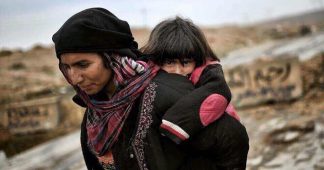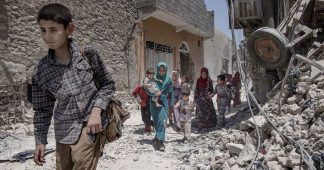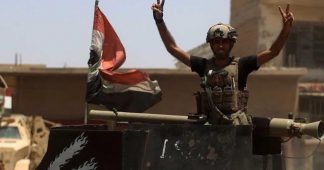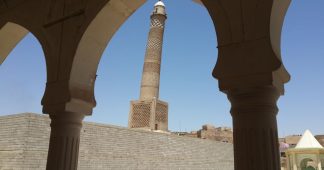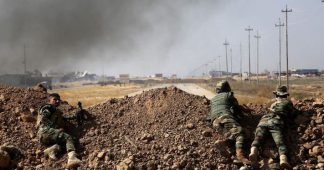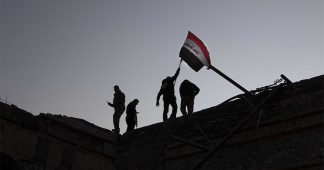What does Mosul victory mean?
Source: www.china.org.cn
By Sajjad Malik
Iraqi forces fought valiantly to dislodge Islamic State remnants from the historic city of Mosul. It is a big occasion and Prime Minister Haider al-Abadi chose to make the victory announcement at the operations room of the Counter-Terrorism Service, whose elite troops were the first to enter Mosul last November.
The success after a nine-month struggle was gained at a huge price. Thousands of civilians have been killed while close to a million residents have been displaced. The city lies in ruins.
Amidst crumpled buildings, there are reports that some militants might still be hunkered down in isolated hideouts prepared to launch reprisals. However, it hardly makes any difference, as Iraqi forces have firm control over whatever is left of a once-bustling urban center.
Iraq’s current misfortunes started on March 20, 2003, when the U.S. launched a massive attack on it without any U.N. authorization. It will go down in history as an unnecessary war killing hundreds of thousands of Iraqis, sharpening religious differences, destroying the country’s social fabric and changing the regional strategic make up.
Islamic State, Al-Qaeda on the Arabian Peninsula and several smaller militant groups are some of the deadliest consequences of the American invasion.
Iraq is slowly regaining some normalcy after almost a decade-and-a-half of war. The defeat of IS in Mosul is a step towards a better future and so means a lot. And Iraqis have every reason to be jubilant, as are their international partners.
It was at the Al-Nuri mosque where Abu Bakr al-Baghdadi was anointed as caliph, after ISIS occupied the city in June 2014. The mosque was demolished by the retreating militants, a symbolic acceptance of defeat.
The fall of this crucial militant base coincides with the reports confirming the death of al-Baghdadi in a Russian strike last month in neighboring Syria. If the report is correct, it will be a huge blow to militancy along with the liberation of the city that was his power base.
Yet, it is not the end of Islamic State and its bloody campaign. In fact, it could be just the beginning of another phase of the fight between Iraqi government forces and the militants. This phase will be dominated by guerilla warfare and widespread terrorism by the latter.
The U.S. senior commander in Iraq, Lt. Gen. Stephen Townsend, also said that the war is not over and more struggles lie ahead. However, the Mosul victory has changed the equation and Iraqi forces now have the upper hand.
When ISIS rose from nowhere to overrun towns and cities in Iraq one after another, government forces were on the run. Now, they are better equipped, trained and disciplined and are on the offensive.
The Iraqi government should maintain the momentum against militants despite many challenges. The foremost challenge is to maintain the hold on the cities and countryside recovered and then rebuild them.
To improve the security situation, the government has to increase the number of troops so they can be permanently deployed at critical points around the country they have regained. With better security arrangements in place, the government can focus on the short and long term reconstruction and national development.
Some of the essential services need urgent attention. Iraq has to rebuild destroyed power stations and water supply facilities, as well as provide the daily necessities of life to numerous refugees. It also has to make plans for the reconstruction of roads, bridges, offices and other infrastructure.
The massive drive to keep militants away and carry out rebuilding work demands efficient government and active leadership. This means a government that is ready to lead and reach out to those segments of the society now feeling alienated.
At this critical juncture, the Iraqi government should make it a priority to overcome differences with the Sunni community increasingly feeling marginalized after Saddam Hussein was deposed and later hanged. Some disgruntled Sunni elements may still join the rebels to seek revenge.
The U.S. administration, which is primarily responsible for the Iraqi mess, should learn a lesson and stop playing strategic games at the cost of innocent civilian lives. It should let Iraq function as an independent country, having complete liberty to choose its international friends and partners.
Sajjad Malik is a columnist with China.org.cn
Mosul situation is alarming, media and UN must be impartial – Lavrov
With the media coverage of the situation in Mosul raising many questions, RT’s Maria Finoshina asked Russian foreign minister Sergey Lavrov for his opinion on the matter.
Press release on Mosul
The Embassy of the Russian Federation to the United Kingdom of Great Britain and Northern Ireland
The Iraqi authorities have announced the completion of capturing Mosul. This message was delivered from the liberated city by Iraqi Prime Minister Haider al-Abadi, who arrived as Commander-in-Chief of the Armed Forces to personally congratulate servicemen and militias.
And although scattered pockets of armed resistance by Islamic State remain, a crushing blow has been dealt to ISIS in Iraq. What lies ahead is the elimination of the terrorists’ presence on the entire territory of the country.
The capture of Mosul was accomplished thanks to the courage and perseverance of the Iraqi soldiers, the people’s militia, and the Kurdish Peshmerga forces. The offensive showed the ability of the government and people of Iraq – a friendly nation to Russia – to jointly overcome the challenges of terrorism.
Yet, it should be noted that a high price was paid in the offensive to recapture Mosul. According to various reports, the losses of the Iraqi forces stand at some 30,000. Horrific suffering has been endured by civilians. During the fighting to liberate the city, some 7,000 its residents were killed, as a result of both ISIS actions and the air strikes by the US-led anti-ISIS coalition. About 900,000 Mosul residents have become refugees.
Moscow supports the actions by the Iraqi authorities aimed at restoring the country’s sovereignty and territorial integrity. We are certain that promoting intra-Iraqi national reconciliation, with due account of the interests of all ethnic and religious groups, will consolidate the progress in fighting terrorism.
